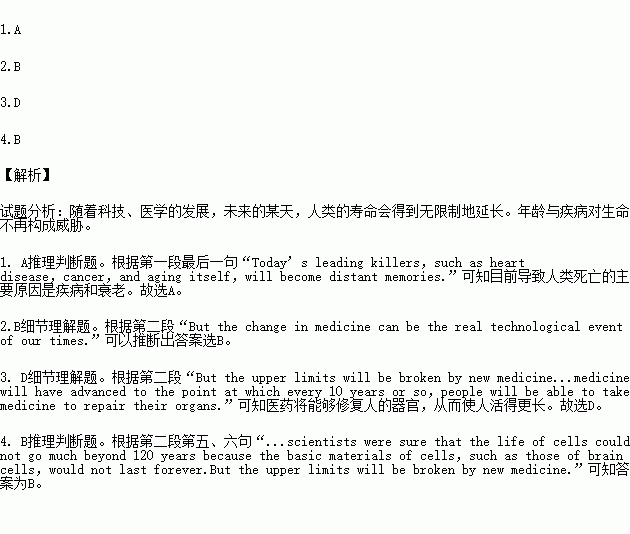题目内容
What will people die of 100 years from now? If you think that is a simple question,you have not been paying attention to the revolution that is taking place in bio-technology(生物技术). With the help of new medicine,the human body will last a very long time. Death will come mainly from accidents,murder and war. Today’s leading killers,such as heart disease,cancer,and aging itself,will become distant memories.
In discussion of technological changes,the Internet gets most of the attention these days. But the change in medicine can be the real technological event of our times. How long can humans live? Human brains were known to decide the final death. Cells(细胞) are the basic units of all living things,and until recently,scientists were sure that the life of cells could not go much beyond 120 years because the basic materials of cells,such as those of brain cells,would not last forever. But the upper limits will be broken by new medicine. Sometime between 2050 and 2100,medicine will have advanced to the point at which every 10 years or so,people will be able to take medicine to repair their organs(器官). The medicine,made up of the basic building materials of life,will build new brain cells,heart cells,and so on-in much the same way our bodies make new skin cells to take the place of old ones.
It is exciting to imagine that the advance in technology may be changing the most basic condition of human existence,but many technical problems still must be cleared up on the way to this wonderful future.
1.According to the passage,human death is now mainly caused by ________.
A.diseases and aging B.accidents and war
C.accidents and aging D.heart disease and war
2.In the author’s opinion,today’s most important advance in technology lies in(在于) ________.
A. the Internet B.medicine
C.brain cells D.human organs
3.Humans may live longer in the future because ________.
A.heart disease will be far away from us
B.human brains can decide the final death
C.the basic materials of cells will last forever
D.human organs can be repaired by new medicine
4.How long can humans live in the future according to the passage?
A.Over 100 years.
B.More than 120 years.
C.About 150 years.
D.The passage doesn’t tell us.
 天天向上一本好卷系列答案
天天向上一本好卷系列答案 小学生10分钟应用题系列答案
小学生10分钟应用题系列答案
